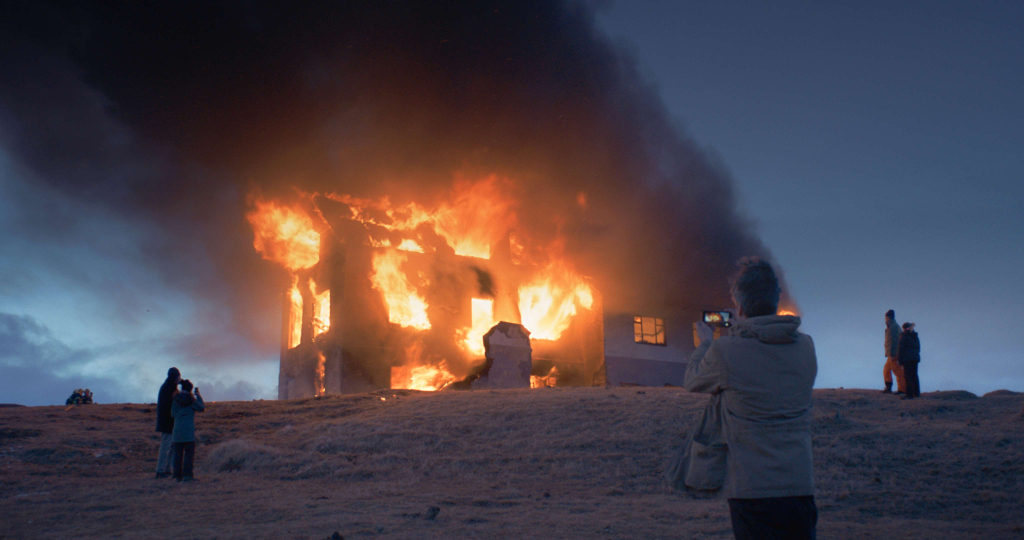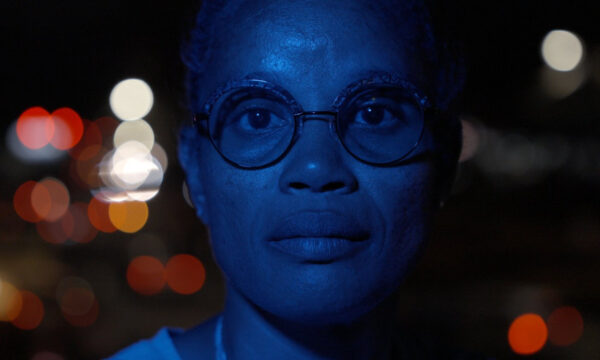Echo (Bergmál): A work of remarkable melancholy and beauty

In English Bergmál literally translates as “rock language”: the sound vibrating off stone, the tantalising echolalia. Rock language is fundamentally didactic. Here is existence, repeat it. Here is knowledge, obtain it. Children learn to talk and think through repetition, by parsing the uncertain pattern of sense data. Adults in turn formulate speech and thought to render these early moments of experience, even if to remind those newly born that life is finite. Three example lessons:
The pool instructor encourages a group of babies to say, “Smile, smile, smile.”
The mother prods her pacified infant, “Do you think birds feel cold in the snow?”
The grandmother tells mortality to a boy, “I’m old and hopefully I will die soon.”
Speech, thought and death: these constitute three out of 56 naturalist vignettes in Rúnar Rúnarsson’s Echo, a work of remarkable melancholy and beauty, the outstanding film of Locarno. Each story offers a shading of humanity during Iceland’s winter holidays, as if it were painted from dawn to twilight, a haystack in a field altering its density and colour. But such scenes should be less seen as impressions, more as pristine snapshots, as elided moments fixed and held in wide-angle clarity. This film shows how people spend Christmas and welcome the New Year: distant and alone, whether in solitude or in crowds.
There is so much imaginative scope for the viewer. We have not just copies of human behaviour but twisted recurrences, points and counterpoints, multiplied into an almost infinite set of denominations. Watching one scene will invoke another, perhaps the previous, perhaps from earlier. This formal trick performs a wondrous emotional creep. The embarrassed memory of a mediocre piano player refigures a seasonal choral tribute. The graveyard recalls a passing visit to a grandfather with dementia. The school nativity refracts a sheep-pen. Residual imagery and theme are everywhere, piecemeal, seeping into the cracks.
What at base unites these tales is the relationship of dialogue and image, of ironies and dissonances between words heard and actions taken. Talking on the phone, a librarian refuses whale meat for dinner. Alone at the table, another man laughs into his screen, stimulated by connection and technology. Particular scenes carry profound weight: the heroin addict seeks treatment; child services respond to a domestic argument; the bully repents at a bus stop. These stare into the comic moments, just as the comic moments stare back.
All human life is here and the writing tends to be pointed. State of the nation conversations lean heavily into generalised political positions. Moments of vanity, ignorance and self-obsession inspire satirical contempt. But Rúnarsson conducts his characters mostly without cynicism. In the pool, babies are urged to speak and smile. Safely held, they babble rote learning in the arms of their parents. This image returns subliminally with an undulating ship, rising and falling on the crest, in a motion that encourages a soft refrain, the reverb of understanding.
And these are sea waves. And these are sea waves. And these are sea waves.
Joseph Owen.
Echo (Bergmál) does not have a UK release date yet.
Read more reviews from our Locarno Film Festival 2019 coverage here.
For further information about the event visit the Locarno Film Festival website here.
























Facebook
Twitter
Instagram
YouTube
RSS